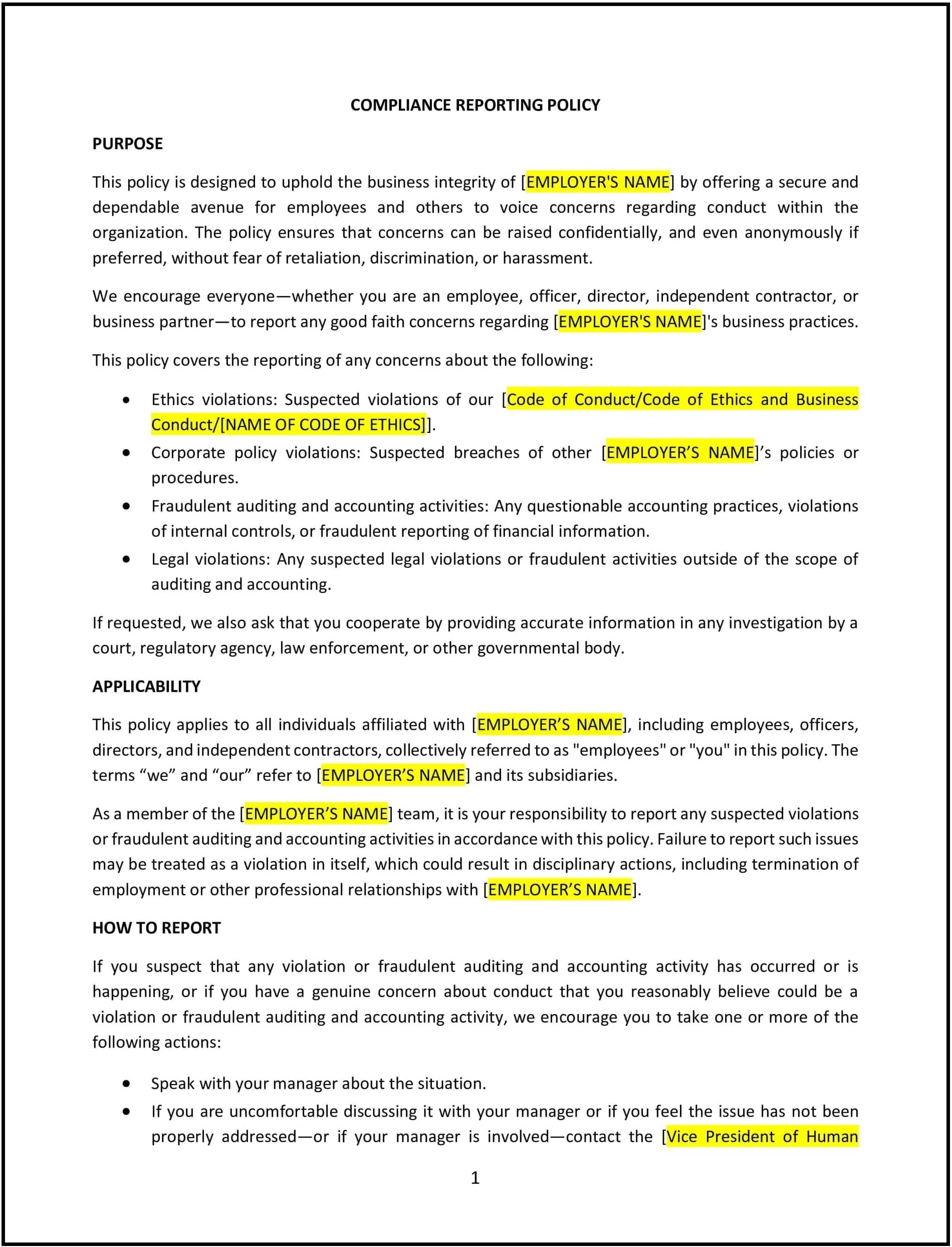Compliance reporting policy (New Hampshire): Free template
Got contracts to review? While you're here for policies, let Cobrief make contract review effortless—start your free review now.

Customize this template for free
Compliance reporting policy (New Hampshire)
A compliance reporting policy helps New Hampshire businesses establish a clear framework for employees to report violations of laws, regulations, or internal policies. This policy outlines the process for reporting concerns, how those concerns will be handled, and the protections available for employees who report misconduct.
By adopting this policy, businesses in New Hampshire can create a culture of accountability, protect their reputation, and ensure that all employees feel empowered to report issues without fear of retaliation.
How to use this compliance reporting policy (New Hampshire)
- Define what constitutes a compliance violation: Clearly specify the types of violations or misconduct that employees should report, including legal, regulatory, and policy-related breaches.
- Set up reporting channels: Provide multiple, confidential ways for employees to report violations, such as a dedicated hotline, email, or an online portal, ensuring that employees feel comfortable using these channels.
- Protect whistleblowers: Outline how the company will protect employees who report compliance issues, ensuring there are no reprisals or retaliation for making a report in good faith.
- Establish investigation procedures: Describe the process by which reported concerns will be investigated, including the steps for gathering information, interviewing witnesses, and determining appropriate action.
- Set timelines for resolution: Define a reasonable timeline for resolving reports, ensuring that employees know when to expect feedback or resolution.
- Address confidentiality: Emphasize that the company will keep reports confidential, sharing information only with those involved in the investigation and resolution process, unless otherwise required by law.
- Encourage prompt reporting: Stress the importance of reporting violations as soon as they are discovered, to minimize potential damage and facilitate prompt corrective action.
- Review and update: Regularly review the policy to ensure it reflects New Hampshire regulations and business needs, updating as necessary to maintain effectiveness and compliance.
Benefits of using this compliance reporting policy (New Hampshire)
This policy provides several benefits for New Hampshire businesses:
- Builds a culture of transparency: Encourages employees to speak up about unethical or illegal activities, promoting a transparent and ethical workplace culture.
- Protects the business: Helps identify and address compliance issues early, reducing the risk of legal or regulatory violations and protecting the company’s reputation.
- Enhances employee trust: Provides employees with a safe, confidential way to report concerns, building trust in the organization and its commitment to doing the right thing.
- Mitigates legal risks: By addressing violations promptly, businesses can avoid larger legal and financial penalties that may arise from unresolved compliance issues.
- Demonstrates a commitment to integrity: Having a robust reporting mechanism signals to employees, clients, and stakeholders that the business takes compliance seriously and is committed to maintaining ethical practices.
Tips for using this compliance reporting policy (New Hampshire)
- Communicate the policy clearly: Ensure that all employees are aware of the compliance reporting policy, understand the types of issues that should be reported, and know how to submit a report.
- Ensure multiple reporting channels: Provide different ways for employees to report concerns, ensuring that they can choose the method that is most comfortable and accessible to them.
- Protect confidentiality: Maintain the confidentiality of all reports to protect the privacy of employees involved in the reporting and investigation process.
- Take timely action: Address all reports promptly and follow through with investigations and resolutions, providing feedback to the reporting employee if necessary.
- Foster a non-retaliatory environment: Make it clear that employees will not face retaliation for reporting compliance issues, helping to encourage the reporting of violations without fear of consequences.
- Review the policy regularly: Review the policy annually or when there are changes in New Hampshire state laws or business operations to ensure it remains relevant and effective.